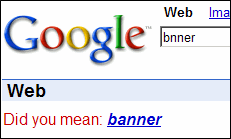Although I've taken the rest of the year off, I wanted to share a few fun classics this week. The Great Google Banner Ad Conspiracy was originally published on 2006-12-09.
 It was only 9:15 in the morning and Neal was ready to write the day off as a complete loss. Neal's day started off with him accidentally pressing the "Alarm Off" button instead of "Snooze," missing his morning workout, driving downtown through the tail-end of a traffic jam, and arriving forty-five minutes late to work. But when he stepped in the office, it was oddly vacant: Was it a company holiday? Did he miss the field trip memo? Was today actually a Saturday? "Neal," the president shouted from his corner office, interrupting Neal's workless fantasy, "get in here; come see this!"
It was only 9:15 in the morning and Neal was ready to write the day off as a complete loss. Neal's day started off with him accidentally pressing the "Alarm Off" button instead of "Snooze," missing his morning workout, driving downtown through the tail-end of a traffic jam, and arriving forty-five minutes late to work. But when he stepped in the office, it was oddly vacant: Was it a company holiday? Did he miss the field trip memo? Was today actually a Saturday? "Neal," the president shouted from his corner office, interrupting Neal's workless fantasy, "get in here; come see this!"
The president could get a bit emotional at times, and Neal had no idea why he was this time, but whatever the reason, it was important. Every employee -- all nine of them -- were huddled in his little office, awkwardly watching him as he yelled out swear words, grunted random advertising terms, and scowled in disappointment. It was a somewhat familiar sight, watching the president like that. He was steaming furious and on the verge of taking his keyboard, chomping off the spacebar, breaking the whole thing across his knee, and then smashing his head through his monitor, parading it around as he stomped out of his office. Neal dared to ask what was wrong.
"It's f---ing Google!" he screamed, "they're f---ing trying to put me out of f---ing business. They're screwing me, you're screwing me, everyone is f---ing screwing me!"
Stunned by his words and the fury in his voice, Neal paused a moment before a eye roll with a wry smile and then asked again. The president scowled at him, but went on to explain.
Everything started with his first search of the day: "war banners." The news reported that the White House edited out some war banners from its videos and he was curious to learn more about the story. But Google would have none of that: it completely ignored his query. It's not that it returned "zero results," it's that it returned nothing. No matter how many times he clicked the button, it just sat on Google's home page. Every other search worked just fine.
 The president's first culprit was the White House, who he figured was trying to cover up the story by censoring the Internet. But then he quickly figured out who really was to blame: Google itself. Anytime he had the word "banner" in a search result, Google would not respond to his clicks. Typing in "bnner" worked: Google suggested "banner" and then would not do anything when he clicked on the suggestion.
The president's first culprit was the White House, who he figured was trying to cover up the story by censoring the Internet. But then he quickly figured out who really was to blame: Google itself. Anytime he had the word "banner" in a search result, Google would not respond to his clicks. Typing in "bnner" worked: Google suggested "banner" and then would not do anything when he clicked on the suggestion.
It was obvious what as was going on. Google wanted to put him and all other banner advertising companies like him out of business. If people couldn't search for or find any banner advertising services, then they'd use Google's advertising. He and his employees spent the last thirty minutes discovering a whole list of banned words: "ad," "media," "advertisement," "advert," etc. It was official: he'd be ruined.
He'd uncovered a great Google banner ad conspiracy to allow them to control advertising revenue and put all the little guys out of business. Sure, he could sue, but Google's team of overpriced lawyers would crush him. His only hope was that Google would quit because of the bad publicity. But why should they? Why would they? They could just ban those words, too!
Neal was a bit skeptical (to say the least) and asked to see it in person. "B-A-N-N-E-R," the president said, speaking aloud every letter as he typed it, "Search. LOOK! Nothing! F---ing nothing!"
Neal let out a sigh and told the president to click the search button again, but to watch the address bar this time. It flashed which, in Opera, indicates that the URL is considered "blocked content." The president had entered his own filters to block all URLs that contain the string "ads", "advert", "banner", "media", and so on. Since those words become a part of the URL when you search for them, Opera refused to load the pages.
In addition to being completely embarrassing, it was a bit ironic. The president of this banner advertising firm spent the entire morning making a complete fool of himself because, like the rest of us, he didn't like viewing banner ads.

